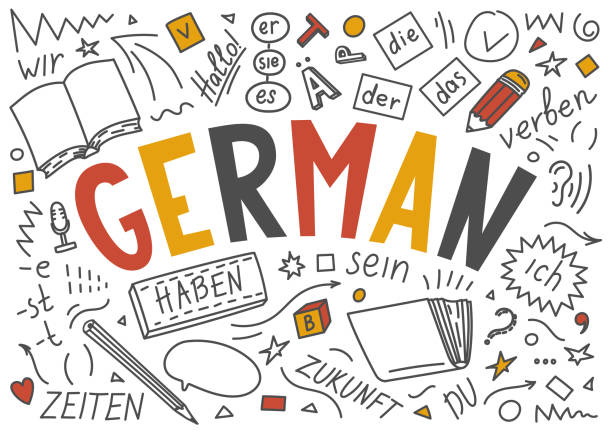
Is German A Hard Language To Learn? A Comprehensive Guide For Beginners And Intermediate Learners.
Is German a difficult language to learn? This is a common question many English speakers ask when they want to learn German. However, the answer is not that simple. It depends on a variety of factors, such as your motivation, your goals, your learning style, your native language, and your previous experience with foreign languages. In this article, I provide a comprehensive guide for beginners and advanced learners who want to know how difficult it is to learn German. I will cover the main difficulties and benefits of learning German, as well as some tips and tricks to overcome challenges and get the most out of the language.
Similarities Between German and English: Why German Is Easier Than You Think.
How long does it take to learn German? According to the US Foreign Service Institute (FSI), German is a moderately difficult language that requires about 900 hours of instruction. But I will show you how to learn German faster than you can in a classroom.
One reason why German is easier than you think is that German and English are both Indo-European languages that belong to the same Germanic branch.
This means that they share a common ancestor and have many words that are similar or identical in both languages. These words are called ‘cognates’, and they can make your life much easier when learning German. It is estimated that around 60% of the words in English and German are cognates, which means that you already know more than half of the German vocabulary without even learning it. For example, words for months, numbers, colors and many other everyday expressions are almost identical in both languages. Here are some examples of common cognates:
English: accent - German: Akzent
English: affair - German: Affäre
English: alone - German: allein
English: apple - German: Apfel
English: athlete - German: Athlet
English: baby - German: Baby
English: banana - German: Banane
English: battery - German: Batterie
English: blue - German: blau
English: book - German: Buch
However, you should also be careful not to fall into the trap of false cognates, often referred to as "false friends". These are words that look or sound similar in both languages, but have different meanings. For example, the word "gift" means present in English, but poison in German! The word "bald" means "without hair" in English, but means "soon" in German. The word "also" means "in addition" in English, but "therefore" in German. To avoid confusion, always check the context and usage of the word and consult a reliable dictionary if in doubt.
You should also learn some tips and tricks to identify and use cognates, such as changing certain letters or sounds, or adding prefixes or suffixes.
For example, you can often change the “y” in English to an “i” in German, such as “party” to “Partei”, or the “th” in English to a “t” in German, such as “mother” to “Mutter”.
You can also add the prefix “un-” in German to make a word negative, such as “happy/unhappy” or “glücklich/unglücklich”, or the suffix “-er” in German to make a word comparative, such as “happy/happier” or “glücklich/glücklicher”.
Another reason why German is easier than you think is that German has only six tenses, compared to English’s twelve, and no continuous forms. This means that you don’t have to worry about the difference between “I do” and “I am doing”, or “I did” and “I was doing”, or “I will do” and “I will be doing”. You just have to learn the present, the past, the future, the conditional, the subjunctive, and the imperative, and how to form and use them correctly.
All of this means that you can make rapid progress in the beginning.
Difficulties of German Grammar: How to Master the Complex Rules.
While some aspects of the German language are relatively easy for English speakers, there are also aspects that make it more difficult than you might expect.
One of the biggest difficulties in learning German is the grammar, which can be complex and confusing. In this section, I will address some of these challenges: case and gender as well as compound words and pronunciation.
German Grammar Rules Can Be Complex and Confusing.
One of the most daunting aspects of German grammar is that there are four cases: nominative, accusative, dative, and genitive. Case indicates the function and relationship of nouns and pronouns in a sentence, such as subject, direct object, indirect object, or possessive pronoun.
Depending on the case, articles (the, a, an) and the endings of nouns and adjectives change. For example, the word "the" in German can be "der," "die," "das," "den," "dem," or "des," depending on the gender, number, and case of the noun.
Another challenging aspect of German grammar is that there are three genders: masculine, feminine, and neuter. The gender of a noun affects not only the article and ending, but also the pronouns and adjectives that go with it.
For example, the word "er" in German can be "er," "sie," or "es," depending on the gender of the noun. The word for "beautiful" in German can be "schön," "schöne," "schöner," or "schönes," depending on the gender, number, and case of the noun.
To complicate matters further, the gender of a noun is not always logical or predictable. For example, the word for "girl" in German is "das Mädchen," which is neuter, not feminine. The word for "sun" in German is "die Sonne," which is feminine, not masculine. The German word for "key," "der Schlüssel," is masculine, not neuter. There are some rules and patterns that can help you guess the gender of a noun, but there are also many exceptions and irregularities to remember.
To master the complex and confusing rules of German grammar, you need to learn and practise them regularly. Here are some tips and tricks that can help you memorise and apply the grammar rules:
- Use flashcards: to help you test your knowledge and memory by showing the question on one side and the answer on the other. For example, you can use flashcards to learn the gender of a noun, the meaning of a word, or the translation of a sentence. You can create your own flashcards or use flashcards already available on the The Haus Of Foreign Languages.
- Use mnemonics, which are memory aids that help you remember information by linking it to something else. For example, you can use the acronym NAGD to remember the order of cases: nominative, accusative, genitive, dative. You can also use the rhyme "der, die, das, wer, wie, was" to remember the nominative article for each gender.
How to Learn German Fast and Effectively? The Best Tips and Resources for Success.
Learning German can be a rewarding and enjoyable experience, but it can also be challenging and frustrating at times. To learn German fast and effectively, you need to have a clear plan, a consistent practice, and a variety of resources.
In this section, I will share with you some of the best tips and resources that will help you achieve your German learning goals.
Set SMART Goals and Track Your Progress.
The first step to learning German quickly and effectively is to set SMART goals. SMART stands for Specific, Measurable, Attainable, Relevant, and Time-bound. SMART goals help you stay focused, motivated, and accountable, and measure your progress and adjust your strategy as needed.
For example, instead of saying "I want to learn German," you could say "I want to learn 10 new words a day, complete a lesson a week, and have conversations with native speakers a month."
To track your progress, you can use a variety of tools, such as: B. A diary, spreadsheet, or app. For example, you can use a diary to write down what you learned, what you practiced, and what you struggled with. You can use a spreadsheet to record how many words, lessons, and conversations you completed and how much time you spent on these activities. Or, you can use a complete platform to The Haus Of Foreign Languages learn new words, review old words, and test your skills.
By setting SMART goals and tracking your progress, you will be able to see how far you have come, how much you have improved, and what you need to work on. You will also be able to celebrate your achievements, reward yourself, and stay motivated.
Study with a German Tutor
Personalised feedback and guidance: One of the best ways to learn German fast and effectively is to study with a German tutor. A German tutor can provide you with many benefits, such as:
Personalized feedback and guidance. A German teacher can assess your level, identify your strengths and weaknesses, and customize the course to your needs and goals. He can also correct your mistakes, explain your concerns and give you tips and suggestions.
Lots of speaking practice: A German teacher can help you improve your speaking skills, which are essential for communication and fluency. He will talk to you, ask you questions, and encourage you to express yourself. The teacher can also help you correct your pronunciation, intonation, and accent.
Tailor-made lessons for you: A German teacher can customize the course to your preferences and interests, making it more interesting and exciting. He can also adapt the course to your learning style, pace, and preferences, making it more effective and efficient.You can check out German classes in Jalandhar.Browse through dozens of qualified and experienced German tutors, and choose the one that suits you best. You can also read reviews, watch videos, and send messages to the tutors before booking a lesson.
A final word
In this article, I've tried to answer the question: how hard is it to learn German? As you can see, the answer is not straightforward - it depends on various factors, such as your motivation, your goals, your learning style, your native language, and your previous experience with foreign languages.
We have also seen that learning German can be both challenging and rewarding. On the one hand, German has some complex and confusing grammar rules, some long and hard-to-pronounce words, and some sounds that are not found in English. On the other hand, German also has many similarities with English, such as a large number of cognates, a relatively simple tense system, and a rich and expressive vocabulary.
With the right resources and a dedicated plan, it won’t be long before you can converse in German with confidence. Viel Glück!




